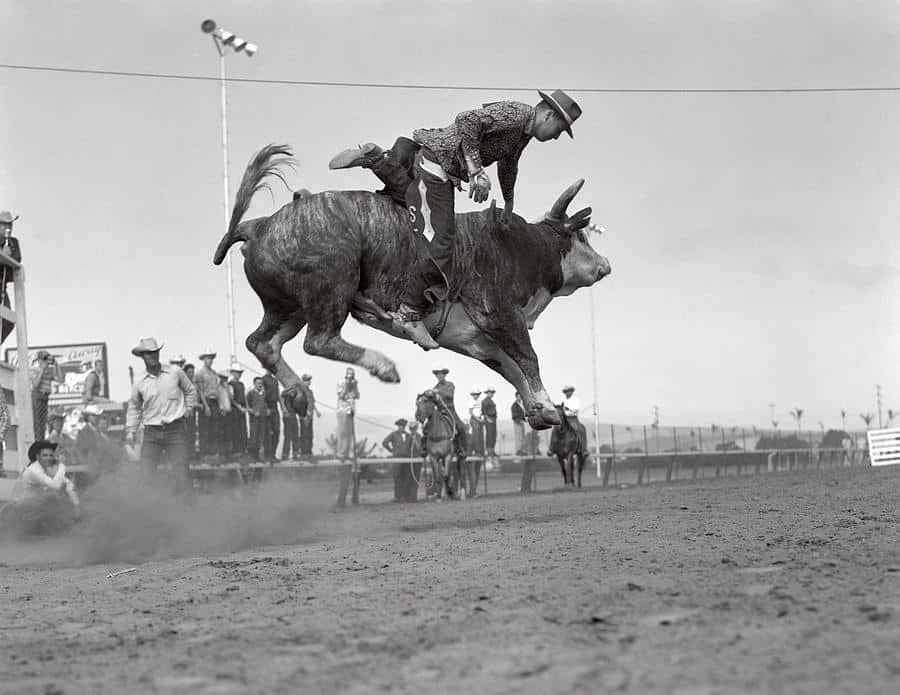The cowboy rodeo is a sport that has its roots in the working skills and traditions of the American West. It began as a way for cowboys to showcase their skills and compete against one another, and has evolved over time into a highly organized and competitive sport that attracts thousands of participants and spectators every year.
The origins of the cowboy rodeo can be traced back to the late 19th century, when cattle drives and roundups were a common feature of ranching life in the American West. Cowboys would gather to compete against one another in informal contests of horsemanship and roping, often in a friendly and informal setting. These early rodeos were a way for cowboys to show off their skills and to establish their reputations as skilled and competent workers.
As the popularity of these contests grew, they began to take on a more organized and competitive structure. The first professional rodeo was held in Prescott, Arizona in 1888, and over the next few decades, a number of other rodeos were established throughout the West. These early rodeos featured events such as bronc riding, bull riding, calf roping, and steer wrestling, which remain staples of the modern rodeo.
The early days of the rodeo were marked by a rough and tumble atmosphere, with few rules and little regulation. However, as the sport grew in popularity, organizers began to establish standardized rules and regulations to ensure the safety of the riders and animals. The first formal rules for the sport were established by the Rodeo Association of America in 1929, and today, the Professional Rodeo Cowboys Association (PRCA) sets the rules and regulations for rodeo events.
One of the most famous early rodeo cowboys was Bill Pickett, who is credited with inventing the steer wrestling event. Pickett was a skilled cowboy who developed a technique for wrestling steers to the ground by biting their upper lip and forcing them to the ground. He performed in rodeos throughout the early 1900s and became known as one of the most talented and daring cowboys of his time.
Tom Mix was another famous cowboy who achieved prominence in both the rodeo and film worlds. Mix was a skilled rider and performer who won a number of rodeo competitions in the early 1900s, and went on to become one of Hollywood’s most popular stars of the silent era. He appeared in a number of western films and helped to popularize the image of the cowboy as a rugged and heroic figure.
Another early rodeo star was Jim Shoulders, who became the first cowboy to win over a million dollars in prize money during his career. Shoulders competed in rodeos throughout the 1940s and 1950s, and was a seven-time world champion in the all-around cowboy event. He was also known for his success in bull riding, and helped to popularize the sport in the United States.
Another early rodeo cowboy who achieved fame was Casey Tibbs, a South Dakota cowboy who won six world championships in the saddle bronc riding event in the 1950s and 1960s. Tibbs was known for his flashy style and flamboyant personality, and helped to elevate the sport’s profile through his appearances in films and other media.
Brazile has won a record 26 world championships in the Professional Rodeo Cowboys Association (PRCA), in a variety of events including steer roping, tie-down roping, and team roping. He is the only cowboy in history to have won world titles in three different events in the same year, which he achieved in 2007 and 2010.
In addition to his numerous world championships, Brazile has also won a number of other prestigious awards and honors in the sport of rodeo. He has been named the PRCA’s All-Around Cowboy of the Year a record 14 times, and has won the National Finals Rodeo (NFR) All-Around Cowboy title a record 13 times.
These are just a few examples of the many famous rodeo cowboys who helped to establish the sport and elevate its profile in the American West and beyond. Their achievements and contributions have helped to make rodeo a beloved and enduring part of American culture.
The modern rodeo is a highly organized and competitive sport, with hundreds of events held every year across the United States and beyond. The PRCA sanctions over 600 rodeos annually, and crowns champions in a variety of events at the end of each season. The sport is also popular at the high school and college level, with many schools offering rodeo teams and scholarships to riders.
Despite its evolution into a highly competitive sport, the cowboy rodeo remains deeply rooted in the traditions of the American West. The events are designed to showcase the skills and techniques used by working cowboys, from bronc riding and calf roping to team roping and bull riding. The rodeo is and will aways be a celebration of the cowboy way of life.





